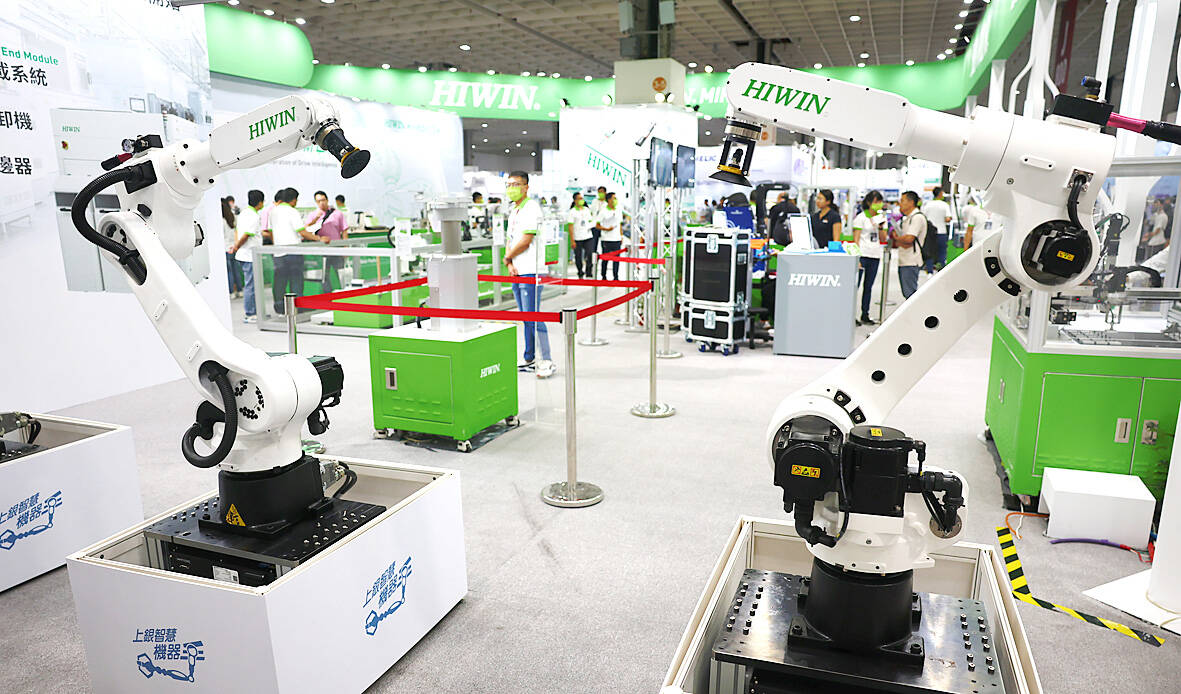Taiwan’s machinery exports last month fell 18 percent year-on-year, dropping for a 15th straight month as the local industry faces challenges such as a weak global economy and unfavorable foreign exchange rates, the Taiwan Association of Machinery Industry said on Wednesday.
Machinery exports — comprising inspection and testing of equipment, electronic equipment and machine tools — totaled US$2.35 billion last month, down from US$2.86 billion a year earlier, data compiled by the group showed.
On a monthly basis, machinery exports declined 4.3 percent from US$2.45 billion, the data showed.

Photo: CNA
This correlated with the decline in the revenue of the nation’s leading machinery maker, Hiwin Technologies Co (上銀), which on Monday reported that consolidated sales last month fell 5.22 percent year-on-year to a nine-month low of NT$2 billion (US$62 million).
Cumulative revenue in the first 10 months of the year decreased 19.19 percent from a year earlier to NT$20.88 billion, Hiwin said.
The association said that a poor global macroeconomic environment continued to weigh on Taiwan’s machinery industry, with last month’s annual decline in exports expanding from the previous month’s 5.1 percent fall.
“The reduced overseas shipments showed that the manufacturing sector remained conservative about the economy and was cautious about investing in equipment,” the association said in a statement.
Exports of machine tools last month fell 24.4 percent from a year earlier, down for nine consecutive months, while overseas shipments of electronic equipment increased 1.3 percent compared with the same period last year, up for a second straight month and signaling a gradual recovery in the semiconductor industry, it said.
In the first 10 months of this year, machinery exports slid 17.2 percent year-on-year to US$24.39 billion, following a 17.1 percent fall in the first nine months, the data showed.
China was the largest buyer of Taiwanese machinery in the first 10 months at US$5.79 billion, which accounted for 23.7 percent of total exports, the association said.
The US ranked second, with purchases totaling US$5.74 billion for a 23.5 percent share of Taiwanese exports, and Japan was third, with purchases totaling US$1.95 billion and accounting for 8 percent of the total, it said.
As global competition for orders is fierce, the foreign exchange rate has become a key factor affecting Taiwanese firms’ ability to attract orders, it said.
The government should keep a close eye on the exchange rates of the Japanese yen, the South Korean won and the Chinese yuan, as these countries are Taiwan’s main competitors, it said.
As of early this month, the NT dollar had depreciated 5.78 percent against the US dollar, while the won had declined 6.79 percent, the yuan 6.09 percent and the yen 15.09 percent, the association said.

Nvidia Corp CEO Jensen Huang (黃仁勳) is expected to miss the inauguration of US president-elect Donald Trump on Monday, bucking a trend among high-profile US technology leaders. Huang is visiting East Asia this week, as he typically does around the time of the Lunar New Year, a person familiar with the situation said. He has never previously attended a US presidential inauguration, said the person, who asked not to be identified, because the plans have not been announced. That makes Nvidia an exception among the most valuable technology companies, most of which are sending cofounders or CEOs to the event. That includes

TARIFF TRADE-OFF: Machinery exports to China dropped after Beijing ended its tariff reductions in June, while potential new tariffs fueled ‘front-loaded’ orders to the US The nation’s machinery exports to the US amounted to US$7.19 billion last year, surpassing the US$6.86 billion to China to become the largest export destination for the local machinery industry, the Taiwan Association of Machinery Industry (TAMI, 台灣機械公會) said in a report on Jan. 10. It came as some manufacturers brought forward or “front-loaded” US-bound shipments as required by customers ahead of potential tariffs imposed by the new US administration, the association said. During his campaign, US president-elect Donald Trump threatened tariffs of as high as 60 percent on Chinese goods and 10 percent to 20 percent on imports from other countries.

Taiwanese manufacturers have a chance to play a key role in the humanoid robot supply chain, Tongtai Machine and Tool Co (東台精機) chairman Yen Jui-hsiung (嚴瑞雄) said yesterday. That is because Taiwanese companies are capable of making key parts needed for humanoid robots to move, such as harmonic drives and planetary gearboxes, Yen said. This ability to produce these key elements could help Taiwanese manufacturers “become part of the US supply chain,” he added. Yen made the remarks a day after Nvidia Corp cofounder and chief executive officer Jensen Huang (黃仁勳) said his company and Taiwan Semiconductor Manufacturing Co (TSMC, 台積電) are jointly

MARKET SHIFTS: Exports to the US soared more than 120 percent to almost one quarter, while ASEAN has steadily increased to 18.5 percent on rising tech sales The proportion of Taiwan’s exports directed to China, including Hong Kong, declined by more than 12 percentage points last year compared with its peak in 2020, the Ministry of Finance said on Thursday last week. The decrease reflects the ongoing restructuring of global supply chains, driven by escalating trade tensions between Beijing and Washington. Data compiled by the ministry showed China and Hong Kong accounted for 31.7 percent of Taiwan’s total outbound sales last year, a drop of 12.2 percentage points from a high of 43.9 percent in 2020. In addition to increasing trade conflicts between China and the US, the ministry said